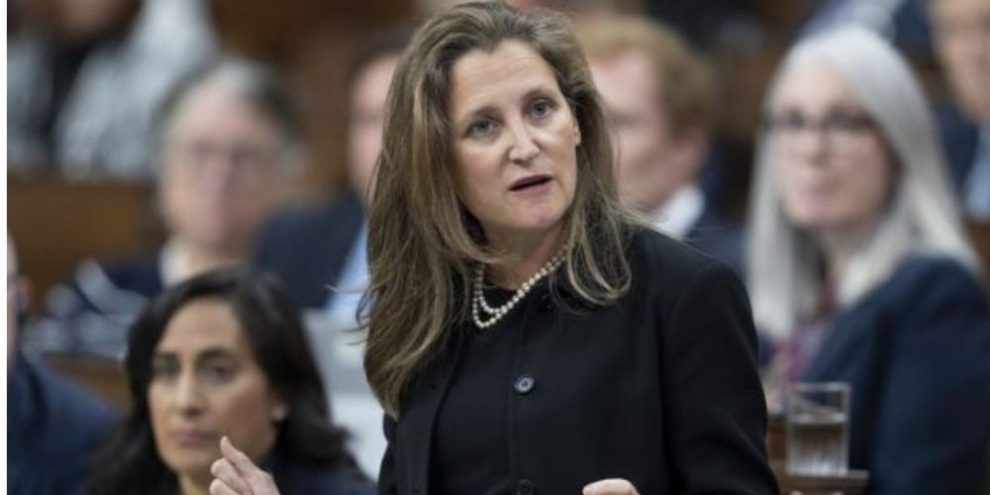
By Nojoud Al Mallees in Ottawa
The fiscal update suggests a federal budgetary surplus is on the distant horizon for the first time since the Liberals came to power seven years ago, but that picture is clouded by a potential recession and promises to spend a lot more to support Canada’s transition to a clean and green economy.
The Liberals would also need to fight another election before getting there.
The forecast came in the fall economic statement that Finance Minister Chrystia Freeland tabled in the House of Commons on Thursday, which includes new measures to spur clean energy investment and improve affordability for Canadians struggling to keep up with the rising cost of living.
Overall, the mini-budget proposes relatively modest new spending amid growing political pressure to demonstrate fiscal restraint.
!-- Begin Constant Contact Inline Form Code -->The $30.6 billion promised over the years leading up to 2027-28 includes money set aside for previously announced measures such as temporarily doubling the GST credit, topping up the housing benefit and a dental-care benefit as part of the agreement the Liberals made with the New Democrats.
The update also focused on matching clean energy investments and tax incentives made recently in the United States through its Inflation Reduction Act.
It also pledged some more affordability measures, such as permanently eliminating federal interest charges on student loans and revamping the Canada Workers Benefit so that people who qualified for it in the previous year can receive an advance instead of waiting to file their tax returns.
In her speech to the House of Commons on Thursday, Freeland reiterated the federal government’s commitment to staying out of the way of the central bank’s efforts to battle rising prices.
"As the Bank of Canada fights inflation, we will not make its job harder," Freeland said in a copy of her speech provided in advance. "We are compassionate and we are also responsible."
Scotiabank’s director of fiscal and provincial economics, Rebekah Young, said the new measures will not fuel the flames of high inflation given much of the spending will not begin to flow this year.
"What we see today isn't itself going to drive inflation," said Young.
Decades-high inflation has put pressure on the federal government to avoid fuelling inflation with additional spending as the Bank of Canada raises interest rates.
The Liberals are also proposing a two per cent tax on corporate stock buybacks in an effort to encourage companies to invest in their domestic operations and workers.
It slots an additional $1 billion in disaster relief in the wake of post-tropical storm Fiona.
The fiscal update also provides an average of private sector economic forecasts, which suggest the Canadian economy will grow by 3.2 per cent in 2022, followed by significantly slower growth of 0.7 per cent in 2023.
The forecast also provides a downside scenario in which the Canadian economy would enter a recession next year.
For the current fiscal year, the mid-year budget update is forecasting a $36.4 billion deficit, which is about $16 billion lower than anticipated in the spring budget thanks to high inflation and a strong economic recovery boosting government revenue.
The fiscal update says the federal debt as a share of GDP is 42.3 per cent in fiscal 2022-23 and projected to steadily decline until reaching 37.3 per cent in fiscal 2027-28.
In the longer run, the federal government is forecasting a budget surplus of $4.5 billion during the 2027-28 fiscal year.
This marks the first time the Liberals have forecast a balanced budget since coming into power in 2015. Prime Minister Justin Trudeau, when campaigning as Liberal leader that year, had promised to run just three years of “modest, short-term” deficits before balancing the budget.
However, achieving that budget surplus may be challenging amid growing risks of a global recession, said Young.
The economist said the Canadian economy is heavily influenced by global economic forces, including central banks raising interest rates to clamp down on high inflation.
"These exogenous drivers could really sway how things look over the next year or two," Young said.
The forecast also does not take into consideration future spending plans, adding another layer of risk around whether the federal government does indeed post a surplus.
The fiscal update suggests more investments in clean energy will be outlined the coming spring budget.
This report by The Canadian Press was first published Nov. 3, 2022.






